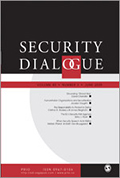National Risk Registers: Security Scientism and the Propagation of Permanent Insecurity

Autor(en): Jonas Hagmann, Myriam Dunn Cavelty
Journaltitel: Security Dialogue
Reviewed:
Band: 43
Ausgabe: 1
Seiten: 80-97
Verlag(e): SAGE
Publikationsjahr: 2012
